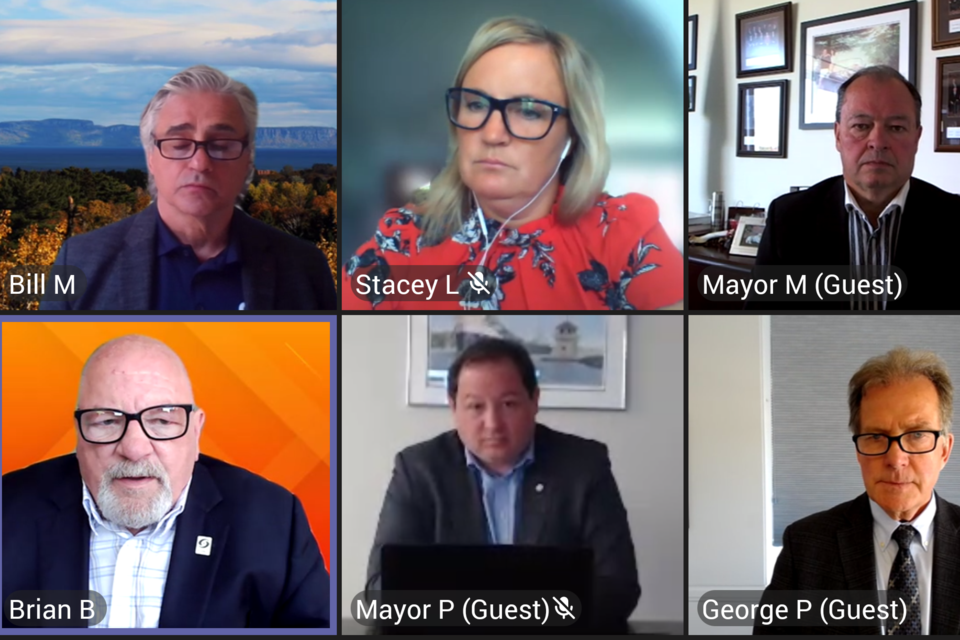A virtual meeting of the Northern Ontario Large Urban Mayors (NOLUM) focusing largely on the social issues and upheaval facing each of their respective communities elicited some overriding common themes.
This was a weary-looking group of mayors who have been facing the harsh realities of a worsening opioid crisis and the ancillary social problems that go with it. The municipalities of North Bay, Sault Ste. Marie, Sudbury, Thunder Bay and Timmins face similar issues and will appeal to the upper levels of government for help dealing with those issues.
They addressed the media and took questions following their discussions and presented a united front to acknowledge what is going on in their communities, to seek solutions to the complex issues, and to advocate on behalf of the Northern Ontario cities they lead with the hope of somehow stemming an opioid epidemic growing deadlier as each pandemic month has passed.
Included in the NOLUM action items coming out of Tuesday's meeting are requests for face-to-face meetings to discuss funding and options with Prime Minister Justin Trudeau and Ontario Premier Doug Ford and advocacy for a national strategy on opioids.
The mayors took turns answering questions as they affected their own communities with the understanding their answers generally applied to the other four cities. The topics covered included the increasing deaths due to opioid use, homelessness, a rise in violence and crime, and a lack of health care services geared to addressing mental health and addictions.
The consensus — and much of the discussion — began with and circled back to opioids.
"It's clear to all of us the most pressing issue we all face is the opioid epidemic and the addictions issues that are prevalent in all of our communities and are more acute in Northern Ontario," said Sault Ste. Marie Mayor Christian Provenzano on behalf of the group.
Some of the largest increases in opioid-related death rates during the COVID-19 pandemic were found in northern and rural parts of the province, in and around the NOLUM member cities, according to a report from the Ontario Drug Policy Research Network.
"We are losing hundreds of lives to this crisis every month in Ontario, and the situation continues to worsen. These data reinforce the urgency of the overdose crisis in Ontario, and the need for a rapid, coordinated response by all levels of government to provide emergency funding and support for community-based harm reduction programs throughout the province," said Dr. Tara Gomes, one of the report's principal investigators.
Mayor George Pirie noted Timmins had already recorded 19 opioid-related deaths this calendar year, double last year's death rate.
North Bay Mayor Al McDonald responded to questions on how the NOLUM cities are reacting to the situation with, "There is no playbook. We all saw the pictures of individuals overdosing on the streets of Vancouver and to put it into perspective, per capita we're higher than Vancouver."
McDonald feels it is important to recognize the expertise needed to deal with mental health and addictions and other complex issues such as homelessness is not generally found among a municipality's staff.
"We don't have the expertise, nor do we have the funding," he explained. "We all want to play a role in finding a solution," he added in mentioning the Mayor's Roundtable of 29 community stakeholders in North Bay.
The social issues are "bigger than the municipality. I think it's even bigger than the provincial and federal governments. I think society has to come together to find some solutions," McDonald observed. "I'd like to say to you we have a solution but we don't."
Timmins "has a very active opioid crisis," according to Pirie, who shared he had lived in Vancouver some 30 years before. "Literally everything that is happening now [in our cities] happened first in Vancouver.
Pirie said he favours supervised consumption sites, similar to those in Vancouver, as a means to mitigate some of the public health risks associated with drug use, as well as the approaches taken by health organizations in B.C.
"Personally, I don't think that we've learned fast enough from that experience in Vancouver," he continued. "We've got to be quicker. This is a dramatic change in our communities because of this opioid crisis that has affected homelessness, affected crime."
"The types of violence we're seeing in our communities, the guns and gangs we're seeing in our communities, opioids, homelessness — they're all connected," stated Thunder Bay Mayor Bill Mauro.
Sudbury Mayor Brian Bigger noted from each tax dollar, municipalities receive nine cents.
"That's why when you hear us saying 'We're doing everything we can at the municipal level,' we absolutely need the support of the provincial and federal governments."
McDonald admitted the issues municipalities are facing are "really out of my league. I've learned so much in the last couple of years on opiates and homelessness and I continue to learn more. We really need the experts to come in and assist us."
"We recognize this is where the rubber hits the road, right here in these municipalities. Every single mayor has an ask out there," to the province, added Pirie.
"This area, in northern Ontario, this is really where the crisis is, right now," added Pirie. "We've got to grab this crisis by the neck because people are dying right now."



